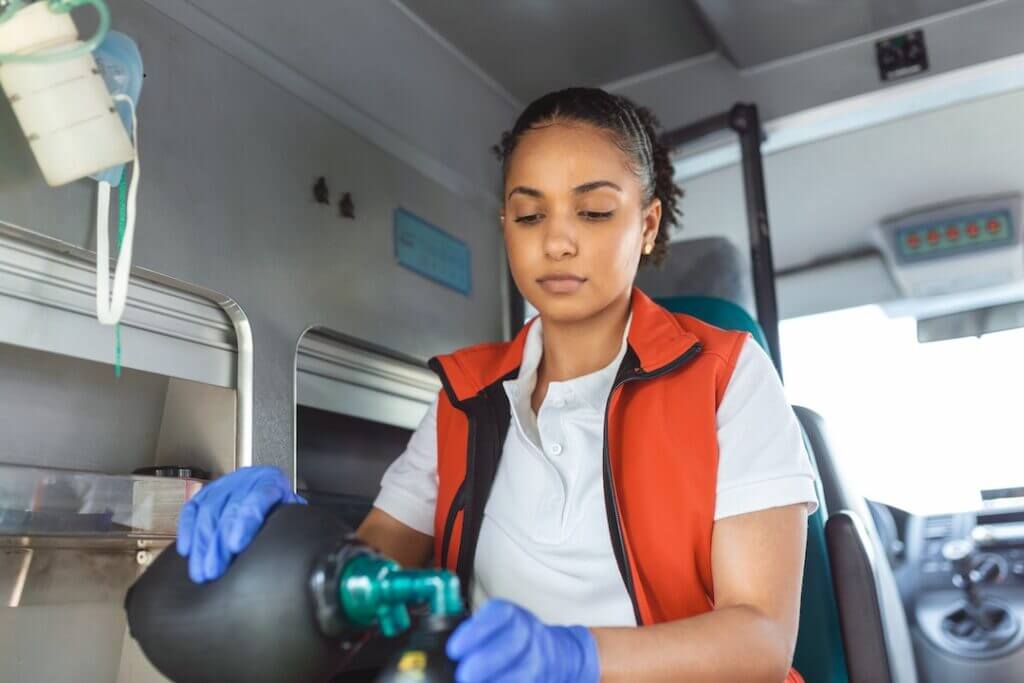

As a first responder in California, you’re accustomed to handling emergencies with composure and resilience. However, when the crisis involves your personal health — such as developing a prescription drug addiction — it’s a different story.
In 2023, California had over 119,000 first responders, including 27,750 firefighters, 68,010 police and sheriff’s patrol officers, 18,800 emergency medical technicians, and 5,370 paramedics. It’s important to recognize that you’re not alone. Up to 30% of first responders develop behavioral health conditions, including depression and post-traumatic stress disorder (PTSD), which can increase the risk of substance use disorders.
At Pacific Sands, we understand the unique pressures that first responders face, especially in California. The good news is that because of how common this concern has become, there are many effective (and evidence-based) treatment options for healing.
Understanding Prescription Substance Use Disorder in First Responders
First responders include police officers, firefighters, emergency medical technicians, 911 dispatchers, emergency room personnel, paramedics, and rescue workers. These are people who respond to emergencies every day and are often placed in hazardous situations because of this. Additionally, it is important to understand that first responders are human, and despite your careers, these routine calls and exposures can have a significant toll on a person’s physical and mental health, as well as potentially exposing you to traumatic events. This might result in the development of post-traumatic stress disorder (PTSD).
As a result, you might turn to substances as a way to cope with these experiences. These substances might be alcohol, tobacco, or even prescription painkillers like opioids. Typically, first responders might start taking pain medications after an injury is obtained on the job and might find afterward that it helps with the daily stress associated with the job.
A Closer Look at Prescription Substance Use Disorder in the First Responder Community
Depending on the type of first responder someone has as a job, the likelihood that you will develop a prescription substance use disorder varies. For example, police officers are more likely to develop an opioid use disorder, perhaps more than the average person, due to different risk factors unique to that job. Those risk factors include wearing a heavy gun belt, driving around in a patrol car all day, or exposure to potentially life-threatening or traumatizing experiences, which might result in injuries or chronic pain that might lead to a physician prescribing an opioid painkiller.
Also, it is common for many first responders to use prescription sleep medications when off-duty. These medications are used to aid in falling asleep due to the extended working hours and disrupted sleep patterns that are common experiences for many people in these fields.
Uncovering Why First Responders Are More Prone to Prescription Substance Use Disorders
As mentioned, there are many reasons why a first responder might develop a prescription substance use disorder. This field is more prone to on-duty injuries, sleep disturbances due to long hours, post-traumatic stress disorder, and generally high levels of stress. All of these factors can contribute to the developing substance use disorder. This is especially true if your job puts you in a position where you are more likely to take this medication beyond the prescribed dosage for the condition it is treating.
Many first responders might try to hide a substance use disorder from colleagues. There is a stigma surrounding first responders who have a substance use disorder. This belief is that people who have one are unable to work as first responders or are weak and unfit for duty.
Many fields are trying to confront this stigma to ensure employees get the early treatment people with this condition need. They aim to create various resources to reduce stigma and provide peer support groups. When utilized, these are useful in making people more comfortable to seek the needed help earlier on.
With that said, stigma still exists in this field, which might lead to you being afraid to come forward out of fear of being labeled, judged, or losing your job. Without getting the proper treatment, you might feel alone with your concerns and experience worsening symptoms associated with a prescription substance use disorder.

Addressing the Side Effects and Consequences of Prescription Substance Use Disorders on First Responders
The specific type of prescription that someone has a substance use disorder makes the side effects and consequences vary. Below is a chart that shows the 3 most common medication types that you might have a substance use disorder with, the common side effects associated, and how it might impact your professional life.
| Medication Type (Examples of the Type) | Common Side Effects | How It Impacts a First Responder’s Professional Life |
|---|---|---|
| Depressants (Amytal, Ativan, Xanax, Ambien, Lunesta) | Decreased attention span, impaired judgment, memory concerns, slurred speech, lack of coordination | This might lead to you not being able to focus on an important, life-saving task, make the wrong judgment call, leading to complications with the call, not remembering certain tasks, or lacking the hand-eye coordination to accomplish certain tasks that are vital to your job’s responsibilities |
| Opioids (Codeine, Actiq, Vicodin, Kadian, Avinza, Oxycontin, Percocet) | Confusion, Lack of coordination, weakness, dizziness, sleepiness, breathing problems | This might lead to you feeling confused about a certain task, not having the strength or energy to perform physical tasks, having difficulty breathing while responding to a call, or lacking the coordination to accomplish job-specific tasks |
| Stimulants (Adderall, Concerta, Ritalin, Dexedrine, Metadate) | Irregular heartbeat, loss of appetite, memory loss, inability to think clearly, aggression, restlessness, tremors, delusions, hallucinations | This might lead to you being unable to complete certain tasks, having a difficult time completing tasks safely, experiencing inappropriate behaviors for the workplace, or seeing or believing certain things are happening that aren’t actually and putting oneself or coworkers in danger. |
With all of these types of substances, having a substance use disorder puts you at an increased risk of experiencing an overdose, which is a medical emergency. Depending on when you took those substances, it might occur while on the job or result in a coworker responding to the call. If your job requires you to be away from the substance for long periods, you might experience very uncomfortable and distracting withdrawal symptoms during your work day.
How Do I Know I Have a Prescription Substance Use Disorder
A prescription substance use disorder has many of the same signs and indications as other types of substance use disorders:
- Strong cravings for the prescription medication
- Not being able to concentrate on things other than the prescription medication
- Avoiding work, relationships, or personal responsibilities to take or recover from the substance
- Spending time, energy, and resources trying to obtain more of the medication
- Taking more of the medication than prescribed
- Neglecting activities that used to bring joy in favor of taking the medication
- Experiencing very uncomfortable withdrawal symptoms when having to be without the medication
Noticing any of these signs is an indication that you should attend treatment for a prescription substance use disorder.

Substance Use Disorder Treatment Is Available in Santa Ana, CA, for First Responders
As a first responder, it might feel impossible to do your job and manage a prescription substance use disorder at the same time. You might feel like if you recover from this condition, you will never be able to return to the job that you love without feeling like you need that medication to function.
This is not true. You can achieve a successful recovery and still return to your careers after treatment while maintaining that level of success. This is because during drug rehab, you will learn and practice the necessary skills and techniques that will make it easier to transition back to your personal and professional life.
Pacific Sands is a high-end facility in Santa Ana, CA. Our facility has a 6-client maximum with private rooms, ensuring each client receives the care that will provide the highest opportunity for recovery. We are solution-focused, which means we work with each of our clients individually to explore what has worked for you in the past and how you can translate it to your future. For more information, call us at 949-426-7962.
Pacific Sands – The first step towards a new life.
The post First Responders and Prescription Drug Addiction: Understanding the Consequences of Avoiding Treatment appeared first on Pacific Sands Recovery.
Blog | Addiction News & Resources | Pacific Sands Recovery Center